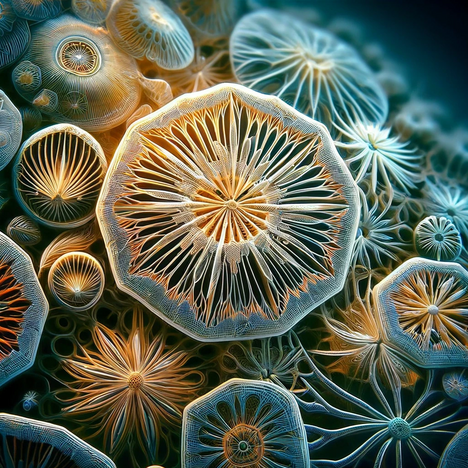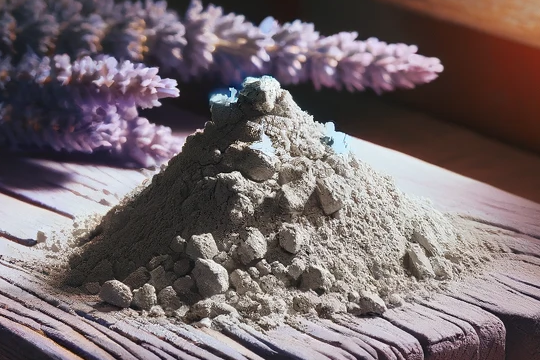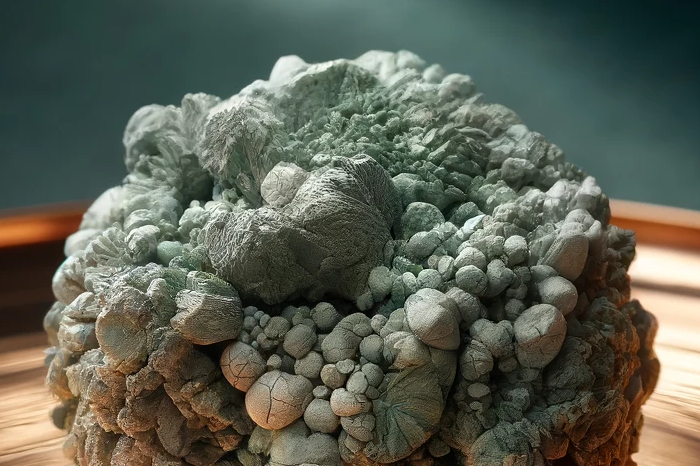Diatoms

What are diatoms?
Diatoms are a group of microalgae found in almost all bodies of water. They are known for their unique cellular walls of silica, which give them a solid structure. Diatoms play a crucial role in the ecological balance of water bodies as they are a primary food source for many aquatic organisms. In animal nutrition, including dog nutrition, they are valued for their high nutrient content and potential health benefits.
Benefits of diatoms for dogs
Natural source of minerals
Diatoms are a rich source of silicon, a mineral that is important for the formation and maintenance of strong bones, joints and healthy skin and coat in dogs. They also contain other essential minerals such as iron, magnesium and calcium.
Promotion of digestive health
Due to their fine-grained structure, diatoms can help promote intestinal health and support a natural cleansing of the digestive tract. They can help remove toxins and heavy metals from the body and improve the absorption of nutrients.
Natural pest fighter
Diatoms are often used as a natural method of controlling parasites and internal worms in dogs. Their sharp edges can kill parasites mechanically without the need for chemical dewormers.
Disadvantages and risks
Respiratory and eye irritation
The fine, powdery consistency of diatoms can cause respiratory irritation in dogs (and humans) if inhaled. Contact with the eyes can also cause irritation.
Quality and purity
Not all diatom products are the same. Some may contain impurities that can be harmful to dogs. Choosing supplements of high quality and purity is critical.
Overuse
While diatoms can provide health benefits in moderate amounts, their overuse can lead to mineral imbalances and other health problems.
Selection and use of diatoms
When deciding to include diatoms in your dog's diet, you should choose products that are specifically intended for animal consumption and free of contaminants. Start with small amounts and monitor your dog's reaction to make sure there are no unwanted side effects.
Diatoms can be a valuable addition to your dog's diet, providing a range of health benefits from improved mineral levels to natural pest control. However, as with any supplement, care must be taken to avoid overdosing and potential risks. An informed decision based on quality, safety and your dog's individual needs will ensure that the benefits of diatoms can be reaped without unwanted side effects.
If you notice any signs of hypersensitivity or poisoning in your dog, you should see your vet immediately. We are not a substitute for a vet, but we try to be as accurate as possible. Every dog reacts differently and we recommend you get a second opinion or consult your vet if in doubt.
Stay healthy and take good care of your four-legged friend!😊
Similar to Diatoms
Bentonite is a fine powder consisting of various clay minerals. The most important are montmorillonite, kaolinite and illite. These minerals have a platelet-like structure that can swell in water...
Zeolite is a naturally occurring, microporous mineral with a unique crystalline structure consisting of aluminum, silicon and oxygen. Its special ability to exchange ions and adsorb molecules makes...
Activated charcoal is made from wood, coconut shells, bones or other organic materials. These are heated and treated with oxygen or water vapor to create small pores. This creates a very large...
A natural clay with unique properties Montmorillonite belongs to the group of smectite clay minerals and is characterized by its ability to absorb water and other substances between the clay...



